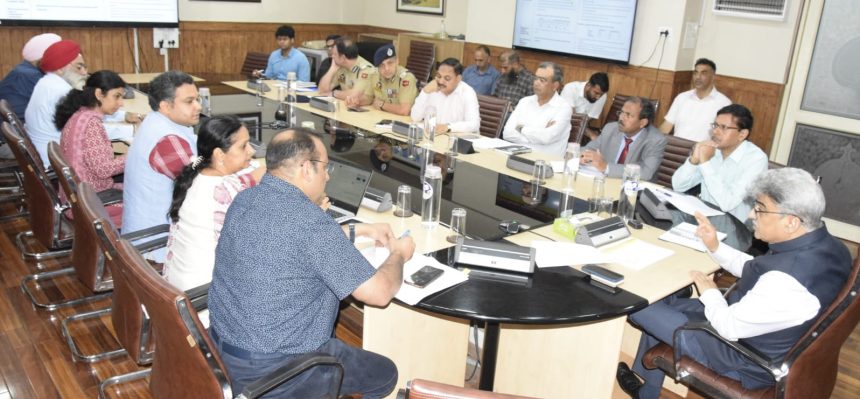Srinagar, Aug 12: Chief Secretary Atal Dulloo on Tuesday chaired a high-level meeting to review the Cyber Security Action Plan for Jammu and Kashmir, focusing on enhancing the UT’s defenses against emerging cyber threats and safeguarding critical digital infrastructure.The meeting was attended by the Secretary of the IT Department; CEO, JaKeGA; State Informatics Officer, NIC; senior officers from civil administration and police, along with other departmental representatives.This review forms part of the government’s ongoing efforts to implement security measures aimed at protecting digital assets, securing sensitive data, and promoting cyber hygiene across all departments.The UT administration has adopted a comprehensive approach, combining rapid-response strategies, structural reforms, and long-term capacity-building initiatives to ensure the seamless delivery of e-Governance services.During the session, the Chief Secretary reviewed progress on actions taken based on earlier directives and reaffirmed the government’s commitment to creating a secure, modern, and resilient digital ecosystem. He emphasized that there should be no compromise in securing the IT infrastructure of the UT.Key initiatives discussed included the Cyber Security Contingency Plan (CSCP), with Secretary IT, Dr. Piyush Singla, informing that a detailed proposal has been prepared and submitted to the Ministry of Electronics and Information Technology (MeitY) for approval.Regarding endpoint and device security, it was reported that over 4,500 devices have been equipped with Endpoint Detection and Response (EDR) solutions, and more than 2,300 devices are secured with Unified Endpoint Management (UEM) tools. The process is ongoing in major Head of Department (HoD) offices and District Collector (DC) offices.The meeting also covered restricted VPN access, which is now limited to multi-factor authenticated users, with geo-fencing enabled to restrict access within India.On website security, it was noted that out of 239 government websites, 140 have been restored following security audits in line with CERT-In and OWASP standards, with web application firewalls deployed to enhance security. Standard protocols are being enforced across departments, unused domains are being rationalized, and cyber hygiene practices are actively promoted.The discussion also covered the ongoing merger of departmental data centers into a centralized State Data Center (SDC), which is expected to be completed within six months to ensure uniform security standards and operational efficiency. A dedicated Network Operations Centre (NOC) and Security Operations Centre (SOC) are being established for real-time cyber threat monitoring.Regarding IT asset management, thirteen departments have already submitted their infrastructure details for comprehensive mapping.Other security measures discussed included the implementation of secure web protocols for video conferencing, transitioning from IPv4 to IPv6, disabling and whitelisting USB devices, and the rollout of e-SAM. Capacity building initiatives, in collaboration with CERT-In, were also emphasized.The Chief Secretary appreciated the progress made and directed all departments to expedite pending measures to further strengthen Jammu and Kashmir’s cyber resilience.
Search
Archives
- August 2025
- July 2025
- June 2025
- May 2025
- April 2025
- March 2025
- February 2025
- January 2025
- December 2024
- November 2024
- October 2024
- September 2024
- August 2024
- July 2024
- June 2024
- May 2024
- April 2024
- March 2024
- February 2024
- January 2024
- December 2023
- November 2023
- October 2023
- September 2023
- August 2023
- July 2023
- June 2023
- May 2023
- April 2023
- March 2023
- February 2023
- January 2023
- December 2022
- November 2022
- October 2022
- September 2022
- August 2022
- July 2022
- June 2022
- May 2022
© 2022 Foxiz News Network. Ruby Design Company. All Rights Reserved.









